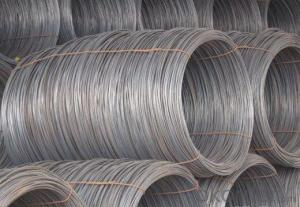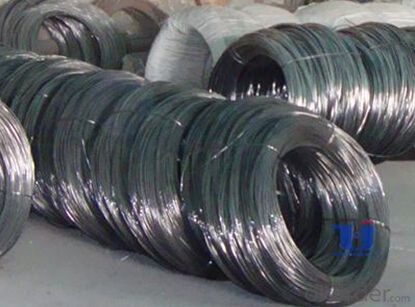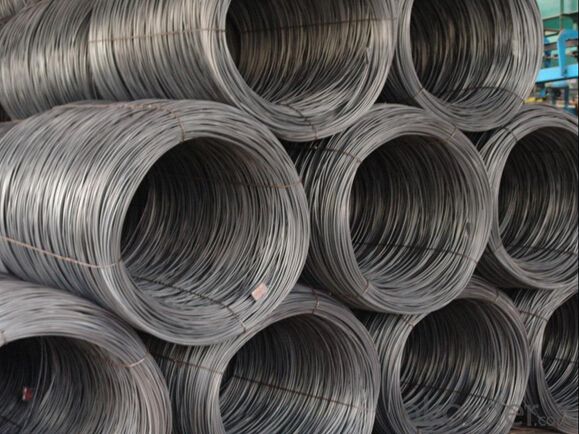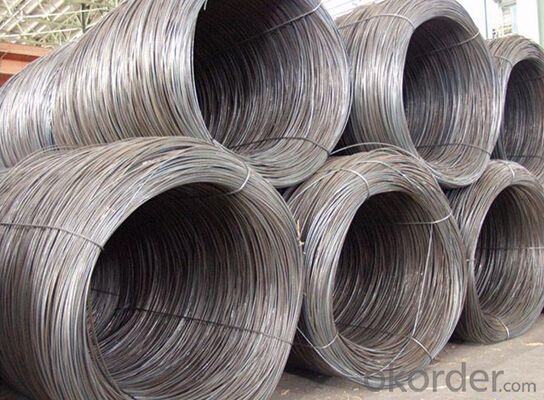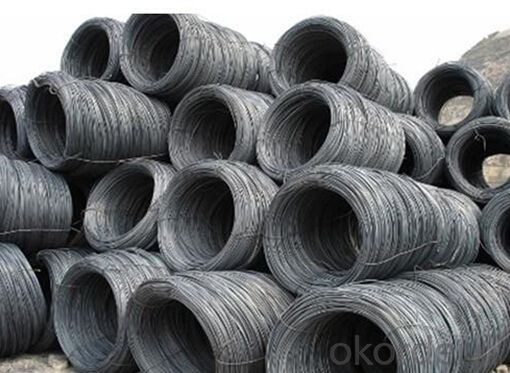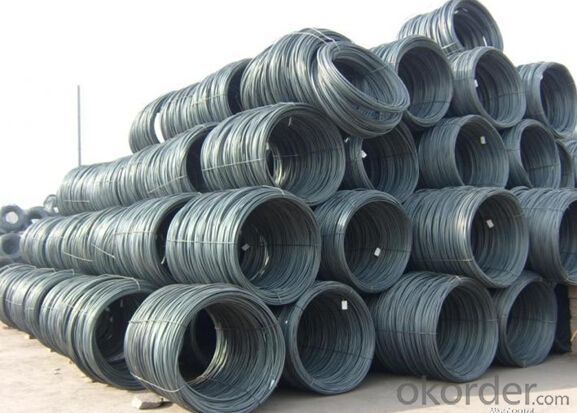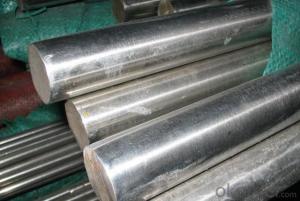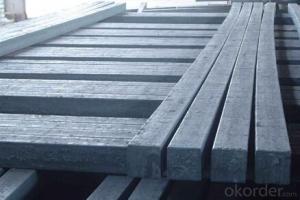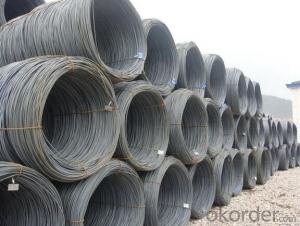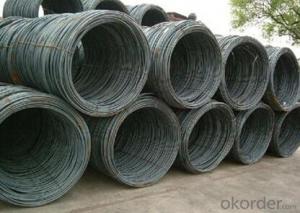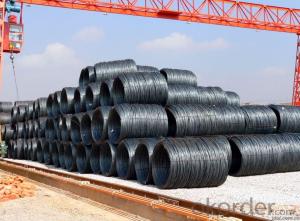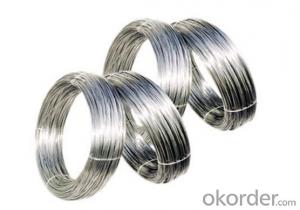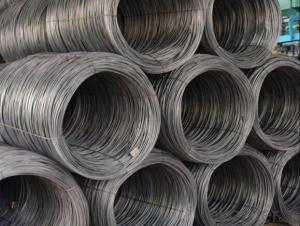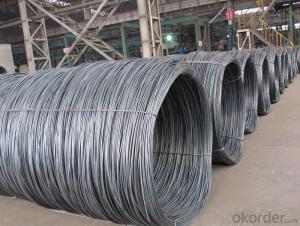Grade SAE 1010 Hot Rolled Steel Wire Rod in Coils
- Loading Port:
- Tianjin
- Payment Terms:
- TT OR LC
- Min Order Qty:
- 3 m.t.
- Supply Capability:
- 10000 m.t./month
OKorder Service Pledge
Quality Product, Order Online Tracking, Timely Delivery
OKorder Financial Service
Credit Rating, Credit Services, Credit Purchasing
You Might Also Like
Specification
Type:
Carbon Steel,Spring Steel,Bearing Steel,Gear Steel,Deformed Steel,Stainless Steel,Alloy Steel
Shape:
Steel Coil,Steel Sheet,Steel Wire Rod,Steel Flat Bar,Steel Square Bar,Steel Angle,Steel Round Bar,Steel Billets
Technique:
Hot Rolled,Cold Rolled,Cold Drawn,ERW,Forged,Saw,Extruded,EFW,Spring
Surface Treatment:
Galvanized,Coated,Copper Coated,Color Coated,Oiled,Dry,Chromed Passivation,Polished,Bright,Black,PVDF Coated
Certification:
ISO,SGS,BV,IBR,RoHS,CE,API,BSI,UL
Thickness:
5.5mm, 6.5mm, 8-14mm
Width:
5.5mm, 6.5mm, 8-14mm
Length:
In coils
Outer Diameter:
5.5mm, 6.5mm, 8-14mm
Net Weight:
2m.t.
Packaging:
Seaworthy packaging
Grade SAE 1010 Hot Rolled Steel Wire Rod in Coils
Detailed Information of the Grade SAE 1010 Hot Rolled Steel Wire Rod in Coils
| Name | Hot Rolled High Carbon Wire Rod |
| Shape | Round Bar/Square Bar/Flat Bar/Plate/Wire |
| Standard | GB/ASTM/SAE/AISI/DIN/JIS/EN/BS |
| Surface Treatment: | Black/Peeling/Polished/Machined |
| Delivery Condition: | Hot Rolled or Forged/Peeled or Black Surface |
| Test | SGS/UT 100% Elements Testing |
| Certificate: | ISO/Mill Certificate |
| Service: | 24 hours online service / |
| more than 20 years trading and manufacture | |
| Quality Assurance: | the third party inspection, such as SGS, BV, TUV…etc. is acceptable |
| Packaging Details: | Seaworthy Packaging or as per customer's packing instruction |
Chemical Composition of the Grade SAE 1010 Hot Rolled Steel Wire Rod in Coils
| Grade | Chemical Composition(%) | |||||
| C | Mn | Si | S | P | B | |
| SAE1010 | 0.1max. | 0.3~0.50 | 0.15max | 0.050max | ≤0.040 | >0.0008 |
| Mechanical properties | ||||||
| Yield strength(N/mm2) | Tensile strength(N/mm2) | Elongation(%) | ||||
| 250-280 | 350-380 | ≥32 | ||||
Company Introduction the Grade SAE 1010 Hot Rolled Steel Wire Rod in Coils
CNBM International Corporation is the most import and export platform of CNBM group(China National Building Material Group Corporation) ,which is a state-owned enterprise, ranked in 270th of Fortune Global 500 in 2015.
With its advantages, CNBM International are mainly concentrate on Cement, Glass, Iron and Steel, Ceramics industries and devotes herself for supplying high quality series of refractories as well as technical consultancies and logistics solution.
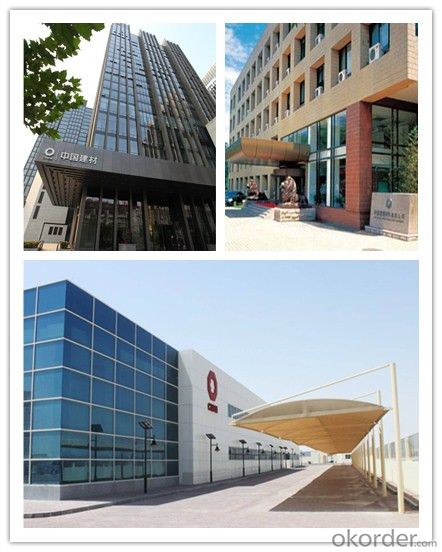
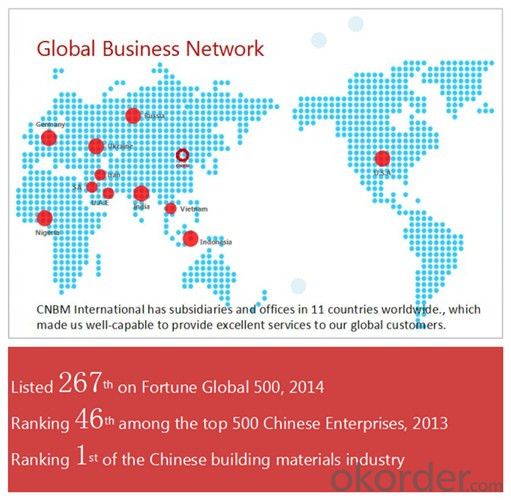
| After-sale service | CNBM provides the services and support you need for every step of our cooperation. We’re the business partners you can trust; you can relax and get on with doing business. |
| For any problem, please kindly contact us at any your convenient time, we’ll reply you in our first priority within 24 hours | |
| Advantages | Industry experience over 20 years. |
| Shipment of goods -More than 70 countries worldwide. | |
| The most convenient transport and prompt delivery. | |
| Competitive price with best service. | |
| High technical production line with top quality products. | |
| High reputation based on best quality products. |
Packaging & Delivery the Grade SAE 1010 Hot Rolled Steel Wire Rod in Coils
| Packaging Detail | Sea worthy packing /as per customer's packing instruction |
| Delivery Detail | 15 ~ 40 days after receiving the deposit |
Products Show
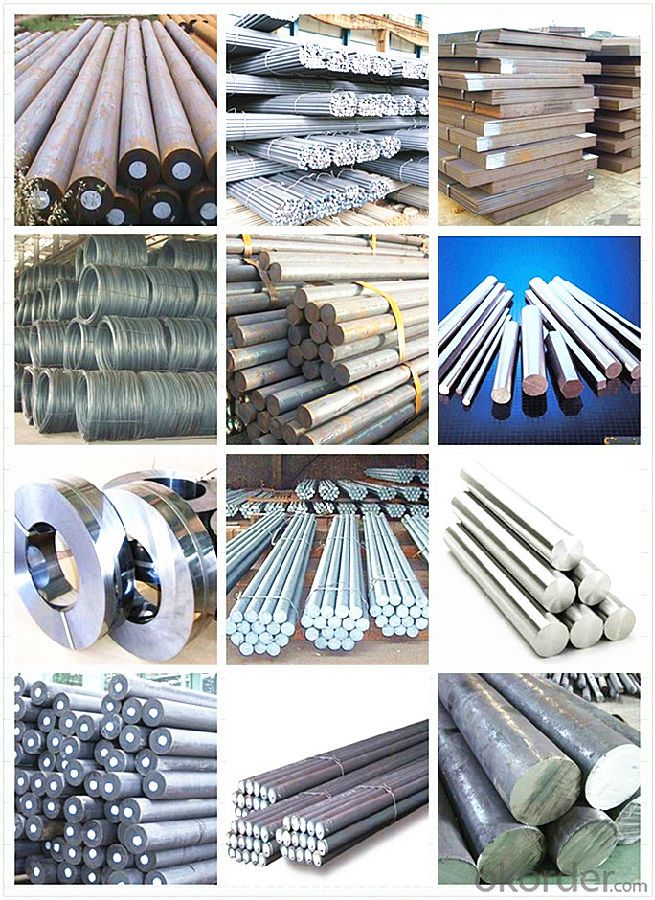
FAQ:
| Are you a trader or manufacturer? | Manufacturer |
| What’s the MOQ? | 3 metric ton |
| What’s your delivery time? | 15-35 days after downpayment received |
| Do you Accept OEM service? | Yes |
| what’s your delivery terms? | FOB/CFR/CIF |
| What's the Payment Terms? | 30% as deposit,70% before shipment by T/T |
| Western Union acceptable for small amount. | |
| L/C acceptable for large amount. | |
| Scrow ,Paybal,Alipay are also ok | |
| Why choose us? | Chose happens because of quality, then price, We can give you both. |
| Additionally, we can also offer professional products inquiry, products knowledge train (for agents), smooth goods delivery, excellent customer solution proposals. | |
| What's your available port of Shipment? | Main Port, China |
| What’s your featured services? | Our service formula: good quality+ good price+ good service=customer's trust |
| Where are your Market? | Covering more than 160 countries in the world |
- Q: What are the challenges in machining special steel?
- Machining special steel poses several challenges, including its high hardness and toughness. Special steels are typically designed to have enhanced properties, such as wear resistance or high strength, which makes them more difficult to machine compared to regular steels. The high cutting forces required and the rapid tool wear during machining are major challenges. Additionally, special steels often have low thermal conductivity, leading to increased heat generation during machining, which further exacerbates tool wear. Therefore, specialized cutting tools, cooling techniques, and machining parameters need to be carefully considered to overcome these challenges and achieve optimal results when machining special steel.
- Q: How does special steel perform in high-pressure and high-temperature environments?
- Special steel performs exceptionally well in high-pressure and high-temperature environments due to its unique composition and properties. It exhibits excellent strength, toughness, and resistance to corrosion, making it ideal for withstanding extreme conditions. Additionally, special steel can maintain its mechanical properties, structural integrity, and dimensional stability even under intense heat and pressure, ensuring reliable performance and longevity in such environments.
- Q: What are the specific requirements for special steel used in the textile industry?
- The primary focus when considering the specific needs of special steel used in the textile industry lies in its durability, corrosion resistance, and heat resistance. To maintain its structural integrity, the steel must withstand the harsh conditions and high temperatures involved in textile processing. Firstly, it is essential for the steel used in the textile industry to possess exceptional durability. It must be capable of enduring significant mechanical stress, such as tension, compression, and bending, without experiencing any deformation or breakage. This is crucial due to the constant movement and repetitive actions of the machinery in the textile industry. Another vital requirement is corrosion resistance. The steel must be able to resist corrosion caused by chemicals, moisture, and other environmental factors. This is particularly important as textile manufacturing processes frequently involve the use of various chemicals and water. Heat resistance is also a crucial factor to consider when selecting special steel for the textile industry. Since manufacturing processes involve high temperatures, the steel must be able to withstand and maintain its strength and properties under these conditions. This ensures the longevity and efficiency of the equipment and machinery used in textile production. Additionally, the steel used in the textile industry should exhibit excellent machinability. It should be easy to cut, shape, and form into various components and parts required for textile machinery. This allows for efficient manufacturing and customization of equipment to meet specific needs. Furthermore, the steel may also be required to meet specific standards and certifications established by regulatory bodies or industry organizations. This ensures that the steel meets the necessary quality and safety requirements. For example, it may need to comply with international standards like ISO 9001 for quality management systems. To summarize, the special steel used in the textile industry must meet requirements for durability, corrosion resistance, heat resistance, machinability, and compliance with relevant standards. Meeting these criteria ensures that the steel can withstand the demanding conditions of textile manufacturing and contribute to the efficiency and reliability of the machinery involved.
- Q: Can special steel be used in the oil refinery industry?
- Yes, special steel can be used in the oil refinery industry. Special steels, such as stainless steel and duplex stainless steel, offer superior corrosion resistance and high strength properties, making them suitable for various applications in oil refineries. These steels can withstand harsh operating conditions, including exposure to corrosive chemicals and high temperatures, ensuring the durability and safety of equipment and infrastructure in the oil refinery industry.
- Q: What are the properties of cobalt-based alloys?
- Cobalt-based alloys typically exhibit excellent corrosion resistance, high strength, and good wear resistance. They also have high temperature stability, making them suitable for use in high-temperature applications. Additionally, these alloys have magnetic properties, allowing them to be used in electromagnetic applications.
- Q: How is special steel recycled or disposed of?
- The material known as special steel, or alloy steel, is highly valuable and in great demand because of its unique properties and uses. When it comes to disposing of or recycling special steel, there are several methods available depending on the condition and quality of the material. Recycling is the most preferred and commonly used method for managing special steel. The recycling process involves gathering, organizing, and melting down the steel scrap so that it can be reused in the production of new steel products. This process helps to preserve natural resources, reduce energy consumption, and minimize waste. The initial step in recycling special steel involves collecting scrap or end-of-life products that contain this material. These sources can include discarded machinery, automotive parts, construction materials, and even old appliances. Once collected, the steel is sorted and separated from other materials, such as plastic, rubber, or non-ferrous metals, using various techniques like magnetic separation, eddy current separation, or manual sorting. After the sorting process, the steel scrap is sent to a specialized recycling facility, commonly referred to as a steel mill or foundry. Here, the scrap is melted down in large furnaces at extremely high temperatures. During this process, impurities and contaminants are removed, and alloying elements can be added to achieve the desired composition and properties of the steel. Once the steel has been melted and purified, it is cast into various forms such as ingots, billets, or slabs, which can then be used to manufacture new steel products. These products may include pipes, bars, plates, or even new machine parts, depending on the specific needs of the industry. When it comes to disposal, special steel should be seen as a valuable resource and not simply discarded as waste. However, in cases where the steel is irreparably damaged or contains hazardous materials, proper disposal methods must be followed. This typically involves seeking advice from specialized waste management companies that can handle the safe and environmentally friendly disposal of such materials. In conclusion, special steel is primarily recycled due to its high value and the various benefits associated with recycling. Through the processes of collection, sorting, and melting, special steel can be transformed into new products while conserving resources and minimizing waste. Proper disposal methods are only necessary in exceptional cases where recycling is not feasible or when dealing with damaged or hazardous materials.
- Q: What are the different methods of improving the fatigue resistance of special steel?
- There are several methods of improving the fatigue resistance of special steel, such as surface treatments, heat treatments, alloying, and grain refinement. Surface treatments like shot peening or nitriding can introduce compressive stresses on the surface, increasing the material's resistance to fatigue. Heat treatments, such as quenching and tempering, can improve the steel's hardness and strength, making it less susceptible to fatigue failure. Alloying with elements like chromium, molybdenum, or vanadium can enhance the steel's resistance to fatigue by improving its mechanical properties. Grain refinement techniques, like severe plastic deformation or precipitation hardening, can also improve fatigue resistance by reducing the size and distribution of grain boundaries in the steel. Overall, a combination of these methods can significantly enhance the fatigue resistance of special steel.
- Q: What are the requirements for special steel used in transportation equipment manufacturing?
- The requirements for manufacturing special steel used in transportation equipment are diverse and depend on the specific application. However, there are common requirements that apply universally. First and foremost, transportation equipment requires special steel that is strong and durable. It must withstand the demanding conditions of transportation, including heavy loads, vibrations, and impacts. To ensure the safety and structural integrity of the equipment, high tensile strength and toughness are essential. Secondly, the special steel must have excellent resistance to corrosion. Transportation equipment is exposed to different environmental factors like moisture, salt, chemicals, and extreme temperatures. Corrosion can weaken the steel and compromise the equipment's performance and lifespan. Therefore, it is crucial to use corrosion-resistant special steel to ensure durability and reliability. In addition, the special steel used in manufacturing transportation equipment should be easily weldable and formable. It should be capable of being shaped and joined together efficiently through welding or other methods. This allows for the production of complex structures and components, enabling the manufacturing of transportation equipment with intricate designs and specifications. Furthermore, the special steel should have good resistance to fatigue. Fatigue failure can occur due to repeated loading and unloading cycles, which are common in transportation equipment. The special steel should be able to withstand these cycles without developing fatigue cracks or failing, ensuring the long-term reliability of the equipment. Lastly, special steel used in transportation equipment manufacturing must meet industry standards and regulations. Depending on the specific application and region, there may be legal requirements and safety standards that need to be met. This can include certifications like ISO, ASTM, or other relevant standards to ensure the quality and performance of the steel. In summary, the requirements for special steel used in transportation equipment manufacturing include high strength, durability, corrosion resistance, good weldability and formability, fatigue resistance, and compliance with industry standards. Meeting these requirements is crucial to ensure the safety, reliability, and longevity of transportation equipment.
- Q: Can special steel be used in the production of consumer goods?
- Consumer goods can make use of special steel in their production. This type of steel is made up of alloys that have been specifically designed to possess distinct characteristics, such as exceptional strength, resistance to corrosion, or heat endurance. These traits enable special steel to be well-suited for a wide array of consumer goods that require longevity, robustness, or protection against wear and tear. One example of the utilization of special steel is in the manufacturing of kitchen appliances, like knives and cookware, where durability and resistance to corrosion are crucial. Additionally, consumer electronics, such as smartphones and laptops, can incorporate this steel in their casing or internal components to ensure structural integrity and safeguarding. Moreover, the automotive industry frequently relies on special steel for the creation of various consumer goods, including bicycles, motorcycles, and cars. The steel's combination of high strength and lightness makes it an ideal choice for constructing sturdy and enduring vehicle frames, engine parts, and other components. To summarize, the application of special steel in the production of consumer goods is indeed feasible due to its unique properties, which make it suitable for situations necessitating strength, durability, and protection against corrosion or wear.
- Q: What are the different methods of improving the toughness of special steel?
- There are several methods that can be employed to improve the toughness of special steel. One common method is through the use of alloying elements. By adding certain elements such as nickel, chromium, or manganese to the steel composition, the toughness can be enhanced. These alloying elements help in increasing the strength and resistance to cracking or fracturing. Another technique is heat treatment. Different heat treatment processes like quenching and tempering can be applied to special steel to modify its microstructure and enhance its toughness. Quenching involves rapidly cooling the steel from a high temperature, which creates a hardened structure, while tempering involves reheating the quenched steel to a specific temperature and then slowly cooling it. Furthermore, the use of grain refinement techniques can also improve the toughness of special steel. By controlling the size and distribution of grains within the steel, it is possible to increase its resistance to fracture. Techniques like grain size control through recrystallization and severe plastic deformation can be utilized to refine the grain structure and improve toughness. Additionally, controlling the impurity content in the steel can contribute to its toughness. Impurities like sulfur and phosphorus can lead to brittleness, so minimizing their presence through refining and purification processes can enhance the steel's toughness. Moreover, surface treatment methods such as shot peening or surface hardening can be employed to improve the toughness of special steel. Shot peening involves bombarding the steel surface with small spherical particles to induce compressive stress, which helps in resisting crack propagation. Surface hardening techniques like carburizing or nitriding can also be used to create a hardened layer on the surface, improving its toughness. In conclusion, the different methods of improving the toughness of special steel include alloying, heat treatment, grain refinement, impurity control, and surface treatment. These techniques can be combined or used individually to enhance the steel's properties and make it more resistant to cracking or fracturing.
Send your message to us
Grade SAE 1010 Hot Rolled Steel Wire Rod in Coils
- Loading Port:
- Tianjin
- Payment Terms:
- TT OR LC
- Min Order Qty:
- 3 m.t.
- Supply Capability:
- 10000 m.t./month
OKorder Service Pledge
Quality Product, Order Online Tracking, Timely Delivery
OKorder Financial Service
Credit Rating, Credit Services, Credit Purchasing
Similar products
Hot products
Hot Searches
Related keywords
